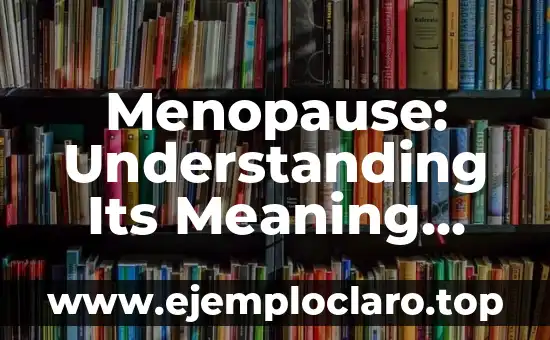Menopause, often referred to as the climacteric, is a natural biological process that marks the end of a woman’s reproductive period. It is characterized by the cessation of menstrual cycles, leading to various physical and emotional changes. This article delves into the intricacies of menopause, exploring its effects, stages, and implications for women’s health.
¿Qué es la menopausia?
La menopausia es la cesación natural de los ciclos menstruales, indicando el fin de la fertilidad femenina. Ocurre generalmente entre los 45 y 55 años, aunque puede variar. Los cambios hormonales, especialmente la disminución de los niveles de estrógeno y progesterona, son centrales en este proceso.
Un dato histórico interesante es que en la antigüedad, la menopausia era vista como una transición a un rol más sabio y respetado en la comunidad, aunque en muchas culturas se consideraba un tema tabú.
The Biological Process of Menopause
Menopause is a natural biological process where the ovaries cease to produce eggs, leading to a decrease in hormone levels. This hormonal shift affects various bodily functions, including metabolism and bone density. The reduction in estrogen can cause symptoms like hot flashes and mood swings, while the decline in progesterone impacts sleep and mood regulation.
Examples of Menopause Symptoms and Effects
Common symptoms of menopause include hot flashes, night sweats, and mood swings. These symptoms can affect daily life, impacting sleep quality and emotional well-being. For example, hot flashes can disrupt work and social activities, while mood swings may strain personal relationships. Additionally, long-term effects include bone density loss, increasing osteoporosis risk.
The Importance of Hormonal Balance During Menopause
Hormonal balance is crucial during menopause, as fluctuations in estrogen and progesterone levels can lead to various symptoms and health issues. Maintaining balance may involve lifestyle changes, such as a balanced diet rich in calcium and vitamin D, regular exercise, and stress management techniques. These steps help mitigate symptoms and support overall health.
Understanding the Different Stages of Menopause
Menopause is divided into three stages: premenopause, menopause, and postmenopause. Premenopause is the transition period where hormonal changes begin, often with irregular periods. Menopause is confirmed after 12 months without menstruation. Postmenopause follows, where symptoms may persist, and health risks like osteoporosis increase. Understanding these stages helps women prepare and manage their health effectively.
The Transition to Menopause: What Women Should Know
The transition to menopause involves physical and emotional changes, affecting each woman differently. Symptoms can vary from mild to severe, impacting daily life and mental health. Emotional aspects may include feelings of loss or anxiety about aging, highlighting the importance of emotional support and professional guidance.
¿Para qué sirve la menopausia?
La menopausia señala el fin de la fertilidad, permitiendo a las mujeres entrar en una nueva etapa de vida. Aunque no tiene una función biológica directa, marca una transición hacia la madurez, afectando salud y estilo de vida. Ejemplo de esto es la necesidad de monitorear la salud cardiovascular y ósea.
The Climacteric: Understanding Its Impact on Women’s Health
The climacteric, another term for menopause, involves hormonal changes affecting women’s health. It impacts bone density, cardiovascular health, and emotional well-being. Managing these changes through diet and exercise can mitigate risks and improve quality of life.
The Role of Hormones in the Female Body During Menopause
During menopause, declining hormone levels affect various bodily functions. Estrogen influences skin health and bone density, while progesterone affects sleep and mood. These hormonal changes can lead to symptoms like hot flashes and mood swings, emphasizing the importance of managing health during this phase.
The Meaning and Significance of Menopause in Women’s Lives
Menopause signifies the end of fertility, bringing biological and emotional changes. It affects physical health and psychological well-being, marking a life transition. Coping strategies include lifestyle adjustments and seeking support, helping women navigate this phase gracefully.
¿De dónde proviene el término menopausia?
El término menopausia proviene del griego men (mes) y pausis (cesación). Primero utilizado en el siglo XVIII, refleja la cesación de los ciclos menstruales. Su reconocimiento en la literatura médica ha evolucionado, aunque en algunas culturas sigue siendo un tema delicado.
Understanding Postmenopause: The Final Stage of Menopause
Postmenopause follows menopause, with potential long-term health risks like osteoporosis and cardiovascular issues. Managing these risks involves regular check-ups and healthy lifestyle choices, ensuring women maintain their well-being in this final stage.
¿Cómo afecta la menopausia la calidad de vida de las mujeres?
La menopausia puede afectar la calidad de vida física y emocionalmente. Síntomas como sofocos y cambios de humor pueden impactar actividades diarias y relaciones. Sin embargo, con el manejo adecuado, muchas mujeres pueden minimizar estos efectos y disfrutar de una vida plena.
How to Use the Term Menopause and Examples in Context
Menopause refers to the cessation of menstrual cycles. For example, She experienced menopause at 50, leading to several lifestyle changes. This term is commonly used in medical contexts to describe this natural biological process.
INDICE







